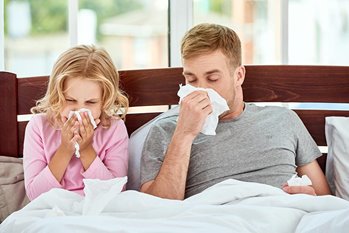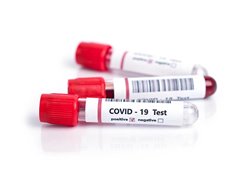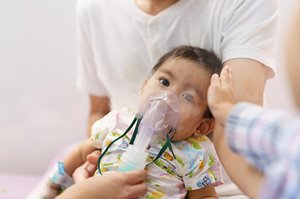 If everyone you know seems to be sick right now—you’re right, they are! Since the end of this past fall, and continuing right on through into winter, the United States has seen a dramatic increase in respiratory illnesses. Indeed, reports of influenza rose sharply in October, 2022, setting up an unusually early beginning to the respiratory illness season. In addition to influenza, the country has been hit by early waves or respiratory syncytial virus (RSV) on top of the coronavirus, SARS-CoV-2, which causes the disease COVID-19.
If everyone you know seems to be sick right now—you’re right, they are! Since the end of this past fall, and continuing right on through into winter, the United States has seen a dramatic increase in respiratory illnesses. Indeed, reports of influenza rose sharply in October, 2022, setting up an unusually early beginning to the respiratory illness season. In addition to influenza, the country has been hit by early waves or respiratory syncytial virus (RSV) on top of the coronavirus, SARS-CoV-2, which causes the disease COVID-19.
The combination of influenza, RSV and SARS-CoV-2—all hitting the United States at the same time—has been referred to as an upper-respiratory “triple-demic,” and is not only leading to a lot of coughs, fevers and hospitalizations, but also to shortages of common prescription and over-the-counter medications.
In order to better understand what is causing the suddening rise in respiratory illness, and what can be done to prevent illness or alleviate symptoms if you do get sick, we spoke with Dr. James Heise, Chief Medical Officer at Door County Medical Center (DCMC), and Dr. Shane Colvin, Pediatrician at DCMC.
Why now—what’s causing the “triple-demic?”
The primary theory for why all of these respiratory illnesses are hitting the country at once, and in record numbers, revolves around the safety measures that were implemented, and widely adopted, during the first years of the SARS-CoV-2 pandemic.
First, it’s important to note that the pandemic lockdown, and simultaneous preventative public health measures (like masking in public, washing your hands, and isolating when you're sick), worked really well and came with a huge upside—it is estimated that those safety measures prevented between 866,350 and 1,711,150 deaths in the US in the first 6 months of the pandemic alone. Moreover, during the pandemic’s first months, when so little was known about COVID-19 and how to treat the disease, the lockdown helped to keep hospitals from being completely overrun with patients.
 The primary goal of the lockdown—reducing the spread of SARS-CoV-2 by limiting the amount of exposure people had with one another—led not only to a decrease in the number of COVID-19 cases, but also to a dramatic decrease in the number of other respiratory illnesses. A good example of this phenomenon can be found by comparing influenza numbers recorded in the months leading up to the pandemic with those recorded during the first year of the lockdown. During the 2019/2020 flu season (October 1, 2019 to April 4, 2020) influenza caused between 24,000 to 62,000 adult deaths, and 195 pediatric deaths. During the following 2020/2021 flu season—that is, during the pandemic lockdown—mortality numbers dropped to just 646, while only 1 pediatric flu death was reported.
The primary goal of the lockdown—reducing the spread of SARS-CoV-2 by limiting the amount of exposure people had with one another—led not only to a decrease in the number of COVID-19 cases, but also to a dramatic decrease in the number of other respiratory illnesses. A good example of this phenomenon can be found by comparing influenza numbers recorded in the months leading up to the pandemic with those recorded during the first year of the lockdown. During the 2019/2020 flu season (October 1, 2019 to April 4, 2020) influenza caused between 24,000 to 62,000 adult deaths, and 195 pediatric deaths. During the following 2020/2021 flu season—that is, during the pandemic lockdown—mortality numbers dropped to just 646, while only 1 pediatric flu death was reported.
Lower levels of exposure and immunity means more illness and hospitalizations
At first glance, lower rates of respiratory illness across the board would seem like a good thing. However, there is a downside—that lack of exposure led, in turn, to lower levels of immunity nationwide to common viruses like influenza, RSV and a number of other viruses, and now that the nation has largely returned to “life as normal” everyone is being exposed to these viruses all at once.
The result has led to the aforementioned huge and simultaneous spike in influenza, RSV and SARS-CoV-2, as well as a nationwide spike in hospitalizations. In 2023, surges in hospitalizations, reminiscent of earlier COVID-19 surges, are now being driven not just by COVID-19, but by several other respiratory illnesses as well. Dr. Heise sums up the situation like this, “Over the course of the last couple of years, we really haven’t had a flu season or much of a respiratory illness season—now we’re making up for it in spades.”
What to know about the different respiratory illnesses causing the “triple-demic”
 RSV: As a common and highly contagious respiratory virus, RSV is generally experienced as a “common cold” by most adults. This is because most people are exposed to RSV before the age of 2, and once exposed to the virus, a degree of immunity means symptoms become less severe and more manageable, with recovery usually taking about a week or two.
RSV: As a common and highly contagious respiratory virus, RSV is generally experienced as a “common cold” by most adults. This is because most people are exposed to RSV before the age of 2, and once exposed to the virus, a degree of immunity means symptoms become less severe and more manageable, with recovery usually taking about a week or two.
However, for children under 2, RSV can become severe enough to lead to hospitalization. “This is basically because their airways are smaller,” says Dr. Colvin. “If you think of the airways of the lungs as an upside down tree,” he adds, “at the very end of the bigger limbs—the bronchi—are the smallest branches—the bronchioles.” He continues, “The bronchioles in young children are very small, and unfortunately, this is the part of the respiratory system that RSV is particularly fond of. When the bronchioles get inflamed, lots of mucus gets stuck in those tiny airways and they can’t get air—that’s when hospitalizations occur.”
Influenza: There are two strains of the influenza virus—A and B—and they are mutating constantly. The result is that as the virus changes, the immunity our bodies have developed during previous infections becomes less effective over time. This is the reason a new flu vaccine is developed every year. According to the CDC, those most at risk of developing complications from the flu are children under 5, adults 65 and older, and people of all ages with chronic medical conditions (like asthma, diabetes or heart disease).
SARS-CoV-2: Contrary to popular belief, the coronavirus pandemic is not over. Like influenza, SARS-CoV-2 is constantly and rapidly changing, and like influenza, a SARS-CoV-2 infection can still lead to serious illness and death. Additionally, with the exception of children (who tend not to get as sick as adults), the same groups of people are at higher risk of developing serious cases of COVID-19—namely, adults 65 and older, people who are immunocompromised, and people of all ages with chronic medical conditions (like asthma, diabetes or heart disease).
Bacterial infections: While viruses are the predominant cause of respiratory illnesses, bacteria can cause respiratory infections as well. “One worth mentioning, because there are a lot of kids with this right now,” says Dr. Colvin, “is group A streptococcus, which causes strep throat. Additionally,” he notes, “if someone does get a viral infection, they are more at risk for developing a secondary bacterial infection. For example, if someone has a cold, then suddenly develops a fever and has ear pain, they probably have a secondary bacterial ear infection. Or,” he continues, “if a child has RSV and they were doing fine, then suddenly developed a fever and are having difficulty breathing, this can be a sign that they’ve developed pneumonia.”
Is there any good news?
Yes! The good news is that viral infections like RSV and influenza, as well as bacterial infections like strep throat and pneumonia, are all common illnesses that physicians have a lot of experience treating.
There’s good news regarding COVID-19 cases as well. According to Dr. Colvin, people are still testing positive for SARS-CoV-2, but fewer are going on to develop the respiratory illness it causes—COVID-19. “The reason that we’re not seeing people develop COVID-19 has to do with the fact that, at this point, the coronavirus has been around for a couple of years now,” he explains, adding, “between widespread vaccinations and immune systems having built up defenses from repeated exposure, the development of serious illness is not as common as it once was.” Additionally, while SARS-CoV-2 may be a new virus, medical science has made great strides in the past few years with regard to treatments, including monoclonal antibodies and antivirals like Paxlovid.
How do I know which virus is responsible for making me sick?
RSV, influenza A and B, and COVID-19 all have similar symptoms. In particular, recent variants of SARS-CoV-2 are less likely to present with those early symptoms that were unique to COVID-19, like loss of smell and taste, shortness of breath or COVID toes. Rather, current strains have developed toward symptoms that more closely resemble those of the common cold.
Common symptoms for RSV, influenza and COVID-19 currently include:
- Runny or stuffy nose
- Sneezing
- Cough
- Sore throat
- Headache
- Fatigue
The preceding list is one that we are all pretty familiar with, and while the overlap of symptoms can be frustrating when trying to figure out which respiratory virus is causing an illness, there are some symptom differences between viruses that are worth noting:
-
Influenza—These viruses are more likely to cause muscle and body aches than RSV or COVID-19. Additionally, the onset of the flu symptoms is generally rapid, while the onset of RSV or COVID symptoms is more gradual.
-
COVID-19—Shortness of breath and the loss of taste or smell are still far more common with SARS-CoV-2 infections. If you lose the ability to smell, it’s most likely COVID.
-
RSV—Shortness of breath is also more common with this virus, but primarily with infants and young children. Additionally, diarrhea and fever are rarely associated with this virus.
For a more comprehensive comparison of RSV, influenza and COVID-19 symptoms, check out this handy symptom chart provided by NBC News.
The importance of getting tested—4-Plex respiratory testing at DCMC
 When you need to know for certain which virus is causing a respiratory illness, Door County Medical Center now offers the Cepheid 4-Plex respiratory test, a real-time molecular test that simultaneously detects and differentiates between SARS-CoV-2, influenza A and B, and RSV.
When you need to know for certain which virus is causing a respiratory illness, Door County Medical Center now offers the Cepheid 4-Plex respiratory test, a real-time molecular test that simultaneously detects and differentiates between SARS-CoV-2, influenza A and B, and RSV.
Beyond the everyday reasons for needing to know exactly which virus you’ve contracted, are more serious reasons for getting a 4-Plex respiratory test. In particular, for those who have chronic pre-existing medical conditions (like diabetes, kidney disease or cancer) are either very young (5 and under) or over 65, or are immunocompromised, knowing as soon as possible which virus is making them sick is incredibly important. The reason for this is simple: treatments and medications for different viral infections are different, and many of those treatments—for example, antiviral treatments like oseltamivir (Tamiflu) for influenza and Paxlovid for COVID-19—are most effective when taken at the onset of symptoms. Knowing exactly which virus is causing your illness will greatly affect the course and efficacy of the care you receive.
Prevention—How do I avoid getting sick?
Get vaccinated: The best way to avoid developing a serious respiratory illness is to get vaccinated. While no vaccine exists that will prevent the common cold (over 200 viruses cause what is known as the “common cold”), keeping up to date on annual flu and COVID-19 vaccines can prevent illness or lessen its severity if you do develop symptoms. “These are very safe and effective,” Dr. Colvin notes, “but if you have questions about the vaccines, talk to someone, like your clinician, who can answer those questions.”
Take preventative measures: All of the preventative health guidelines that were outlined during the pandemic to prevent the spread of SARS-CoV-2 also work to slow the spread of other respiratory illnesses. Preventative measures include:
-
Consider wearing a mask in public—especially if you are at higher risk of illness. Viruses spread primarily through respiratory droplets produced when people breathe, talk, cough or sneeze. Masks prevent the spread of disease by creating a protective barrier between your mouth and nose and the virus. Additionally, the amount of virus that you are exposed to (called viral load) often determines how sick you get. Masks greatly reduce your viral load even if you do become infected.
-
Wash your hands frequently with soap and water—especially after being in public.
-
Avoid touching your face—Viruses are often transmitted to your mouth, nose and eyes via your hands.
-
Support your immune system with healthy habits—Get at least 6-8 hours of sleep a night, eat a healthy diet rich in vitamins and minerals, and exercise on a regular basis.
Treatment—What should I do if I get sick or a family member gets sick?
 Completely avoiding seasonal illnesses is essentially impossible (and as noted above, may not necessarily be a good thing). When you, or someone you know, comes down with an upper respiratory illness, standard remedies tend to work well to alleviate symptoms. These include:
Completely avoiding seasonal illnesses is essentially impossible (and as noted above, may not necessarily be a good thing). When you, or someone you know, comes down with an upper respiratory illness, standard remedies tend to work well to alleviate symptoms. These include:
-
Getting plenty of rest—Don’t try to power through your illness. Stay home from work or school, you’ll get better faster.
-
Staying hydrated—Water, juice and clear broth are all good choices. Avoid caffeine and alcohol.
-
Taking over-the-counter cough and cold medications—Decongestants, fever reduces and pain relievers often help with symptom relief. These won’t shorten the duration of your illness, but they will most likely make it more manageable.
Also remember, antibiotics don’t treat viruses. As noted above, most respiratory illnesses are caused by viruses. “What often happens—what clinicians often experience,” Dr. Heise says, “is that a patient with a respiratory illness will come in and say something like, ‘I just want to get a Zpak (azithromycin). Every year I get sick and every year I take a Zpak and I get better.’ The problem is,” Dr. Heise adds, “antibiotics don’t treat viruses, they only treat bacteria. This doesn’t mean you won’t end up with a secondary bacterial infection a couple of days after the initial viral infection, but at the outset, your illness is almost certainly viral.” He continues, “Trust your clinician—they probably won’t give you an antibiotic right away. Overprescribing antibiotics can lead to antibiotic resistance, and that’s something none of us want.” Dr. Heise recommends contacting your clinician if you don’t get better within a week or two. “If you’re not getting better,” he says, “give them a call, and I bet you they can go to the next step.”
•
Getting sick is never fun, but by taking the proper precautions, there are ways to reduce the number of infections you get and the severity of those infections. As always, if you or someone in your family becomes ill, keep in touch with your physician. “If you’re not certain,” Dr. Heise notes, “you’re always better off seeking help than waiting—it’s better to have someone reassure you than to have illness become a real problem that is hard to address.”
If symptoms persist or worsen, there are several options that will allow you to choose the level of care that makes sense to you and your family. You can:
-
Contact our call center to make an appointment with your provider or another available provider at 920-746-0510.
-
Use the Patient Portal to request an appointment with an available provider.
-
Access Virtual Care—start a visit at any time at https://dcmedical.zipnosis.com/ and receive a response between 7:00 a.m. to 6:00 p.m.
-
Access our website at www.dcmedical.org to check current wait times for Urgent Care. Urgent Care in Sturgeon Bay is open daily from 7:00 a.m. to 7:00 p.m. Patients must register prior to 6:45 p.m.
If you are interested in testing for flu, RSV or COVID-19, or getting a flu or COVID-19 vaccine, please visit our patient portal. Appointments for vaccinations, and the 4-Plex respiratory test, are available through our Lab Drive Thru. If you, or someone you know is having a medical emergency, dial 911.